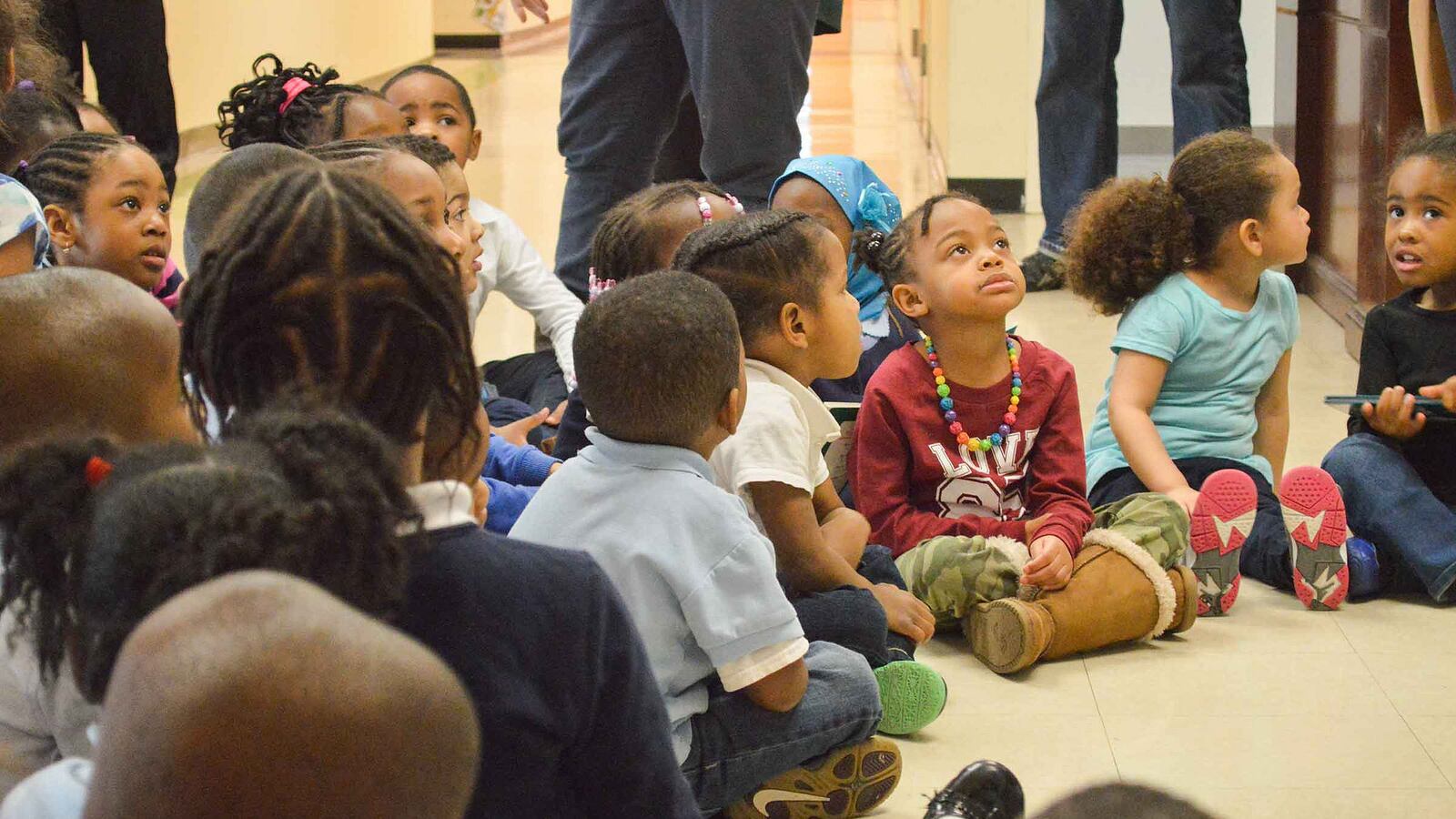For years, votes cast by Newark’s elected school board carried mostly symbolic weight. On Thursday, as the board reclaims full control of New Jersey’s largest school district after a 22-year state takeover, even its smallest decisions will acquire new significance.
A preview of that transformation was on display at a board meeting last week, as members debated when to hold their next round of elections. Moving them from April to November, when other local elections are held, could save the school district about $250,000 per election. But doing so could also politicize the board race, discouraging ordinary citizens from throwing their hats into the ring.
As they weighed their options, board member Crystal Fonseca urged her colleagues to choose carefully.
“Every decision we make reflects on what this board is doing with local control,” she said, moments before the board voted to keep the elections in April. “We’re totally responsible for every penny at this point on. We can’t point the finger anymore.”
The return to local control marks a watershed for Newark, a vote of confidence more than two decades after a state judge decried “failure on a very large scale” within its schools and “nepotism, cronyism and the like” among its school board. It comes as a number of states pivot away from takeovers — an extraordinary intervention whose outcomes have varied — and allow districts from Philadelphia to New Orleans to reclaim authority over their schools.
In Newark, the state takeover had plodded on for years before a recent whirlwind of activity spurred by a $100 million gift from Facebook founder Mark Zuckerberg in 2010 and a bipartisan political alliance between former Gov. Chris Christie and then-Mayor Cory Booker. The aggressive changes thrust Newark into the national spotlight while inflaming local parents and activists who opposed the closure of some neighborhood schools, the expansion of charter schools, and the hiring of expensive outside consultants.
Now, as Newarkers again steer the course of their school system, towering questions loom on the horizon.
Will the district maintain its recent academic gains under a yet-to-be-named superintendent answering to board members representing separate constituencies? Will it manage to shield school budgets from cuts even as more funds flow to charter schools? And will its school board avoid the type of scandals that precipitated the state takeover in 1995, when its members were accused of spending public money on expensive meals and conferences in Hawaii even as the vast majority of the district’s mostly poor students of color failed to pass basic proficiency tests?
“This is a monumental task,” said Tave Padilla, the board’s vice chair. “All eyes are on Newark.”
The board’s first order of business will be to choose a permanent replacement for Superintendent Christopher Cerf, who will step down Thursday, several months before his contract expires, to make way for a new schools chief. (His deputy, Robert Gregory, will act as interim superintendent through June.) Cerf, whom Christie appointed as Newark’s schools chief in 2015, had promised to help Newark regain control of its schools — a years-long process that culminated in September when state officials signed off on the transition.
What’s shaping the conversation: years of sweeping change
Cerf was previously the state education commissioner, where he joined Christie and Booker in devising an overhaul of Newark’s school system that Cerf called “whole-district reform.” Funded in part by Zuckerberg’s gift and a matching amount from other donors, the changes would eventually include performance-based teacher pay, a downsized central office, a single enrollment system for district and charter schools, and the shuttering of 11 district schools. (Last school year, Newark had 64 district schools.) The share of students in charter schools also doubled, with charters now enrolling about a third of Newark’s over 50,000 public-school students.
The changes ignited bitter opposition from the local teachers union and many community members. At one point, several students staged a sit-in at the district headquarters after Cami Anderson, the schools chief who enacted the new policies, stopped attending board meetings where she was drowned out by protestors.

During a press briefing Monday with Booker, now a U.S. senator, Cerf defended the changes made over the past seven years. He said that while officials could have done a much better job explaining the policies and listening to the public’s concerns, “sometimes change has casualties.”
“The measure of success here is not the degree of peace, harmony, or consensus,” Cerf said.
After the reforms began in 2011, students’ annual growth on state tests declined for three years before rising again in 2015, according to a recent study led by Harvard researchers, which tried to measure the impact of the changes. By 2016, students’ annual gains in English, but not math, were higher than comparable students across New Jersey, the researchers found. (A review of the study questioned whether the recent improvements can be linked to the reforms, and said that other New Jersey districts also made gains in 2015 after the state adopted new tests.)
Newark officials note the study did not include 2017 test scores, which went up in both English and math. They also point to other measures of recent progress, including the district’s 78 percent graduation rate — a nearly 20 percentage-point increase from 2011. The district is also retaining more of its highly rated teachers and fewer of those with poor ratings.
Meanwhile, Cerf has managed to ease some of the tensions that flared under Anderson, developing a cordial relationship with the school board and Mayor Ras Baraka, a former principal who was elected in 2014 after fiercely opposing Anderson’s policies. Under Cerf, the district adjusted the new enrollment system based on public feedback, and launched a “community schools” program with Baraka to bring extra social services to several schools in the South Ward, the city’s poorest section.
At a ribbon-cutting last week at the district’s new offices, Baraka said Cerf had done “awesome work.” But he also suggested that it is time for a change.
“Today marks a new day in the district,” he said. “Not just from an old building to a new building, but to a new perspective, a new journey, a new road that we all start out on here in the city of Newark.”
What to watch: the two-year transition ahead
As Newark regains control of its schools, it will be guided by a two-year transition plan created by the state with input from Newark officials.
The 73-page document details actions the district must take — including holding a public vote in November to determine whether the board will continue to be elected or appointed by the mayor. The plan also calls for a state-appointed monitor who will advise the district and track its progress until 2020. (The state selected Anzella King-Nelms, a retired Newark deputy superintendent, for that role.)
The plan also stipulates that several of the district’s current policies should remain in place for at least another year or two, including its approach to teacher evaluation and the joint district-charter enrollment system. “The details in the plan really dictate more of the same,” said Christopher Tienken, an associate professor of education administration at Seton Hall University who has been critical of the state takeover.
For now, while a firm hired by the school board conducts a national search for a new schools chief, the person in charge is Robert Gregory, Cerf’s former deputy.
The son of a Newark educator and the founding principal of American History High School, Gregory said he will devote special attention to recruiting and supporting strong educators. “I’m a people, not a programs, person,” said Gregory, who hopes to be considered for the permanent superintendent job.
The Newark Teachers Union negotiated a contract renewal with the district last year that maintains the performance bonuses while giving teachers more planning time. But recruitment remains a challenge, with fewer than two educators applying for each job opening. Teacher absenteeism is also high: Last school year, the average teacher missed nearly 17 work days, excluding family or medical leave, compared to an average of eight missed days due to illness or personal leave in most districts, according to a 2017 study.
But Gregory’s most daunting task may be helping the district set its budget.
State funding has been flat even as enrollment has grown in recent years, leading the district to sell off buildings, switch health-insurance providers, and relocate its offices to cut costs. The growth of the city’s charter-school sector has also drained district funds: During the current fiscal year, the district transferred $237 million of its $930 million budget to charters schools, a 160 percent increase over 2010.
As Gregory steps into his new role, he’s been meeting with regularly with the board, including at an all-day retreat Saturday. The test for him — and the permanent superintendent who will begin July 1 — will be to serve the board and partner with parents, the teachers union, civic groups and others without being distracted by conflicting demands, said Kenneth Wong, an education policy professor at Brown University who studies school governance.
“Oftentimes, it’s kind of a policy competition,” in districts with elected school boards, he said. “If you don’t have a clear vision, it’s very easy for the district to be pulled apart by all these competing interests.”
As they left last week’s school board meeting shortly before it ended around 10 p.m., Stephen and Tonya Outing seemed to grasp the enormity of the task facing Gregory — and all of Newark.
Two of their children attend the large Lafayette Street School and an older daughter graduated from American History High School while Gregory was in charge. (Stephen called him the “MVP” — most valuable principal.) While they feel the district is headed in the right direction, they ticked off a long list of improvements they hope to see under the new superintendent: better reading instruction, more teacher training, high-performing schools for families to choose from.
“He has a lot of work to do,” Tonya said.
Chalkbeat Newark is coming this March. For more Newark coverage, sign up for our newsletter — also coming soon — here. Finally, we’d love to hear what stories you’d like us to cover. If you have ideas, please drop me a line or fill out this brief survey.

